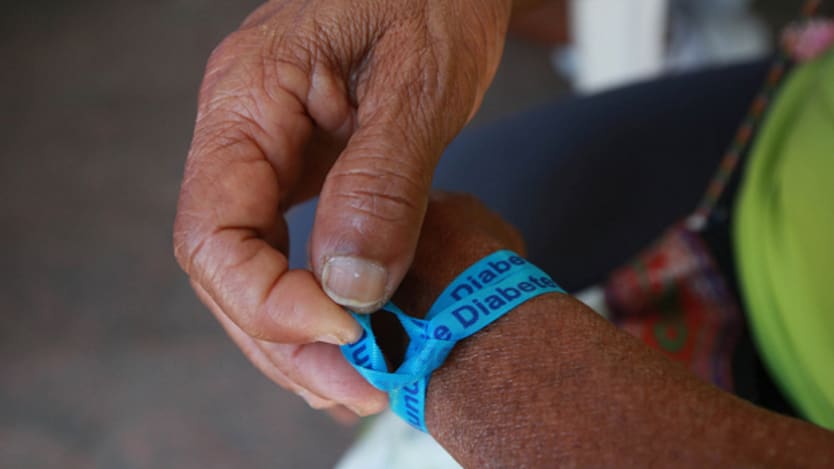
Noncommunicable diseases such as cancers, cardiovascular disease, chronic respiratory disease and diabetes are collectively coming to the fore as a global health priority. Their inclusion in the emerging United Nations-brokered sustainable development goals signals growing awareness of their significant contribution to the burden of disease as well as global development overall.
With more than 80 percent of NCD-related deaths occurring in low- and middle-income countries, NCDs are inextricably linked to development. Cumulatively, these chronic conditions cost LMICs an estimated $500 billion each year — that’s an annual price tag of approximately 4 percent of gross domestic product for countries that can ill-afford it. NCDs affect people during their prime working years, which translates to economic losses to families, communities and ultimately countries.
Universal health coverage, which ensures the provision of health services for all without fear of catastrophic financial loss to individuals and families, has the potential to enable greater access to NCD-related care to more people.
However, efforts and resources to address NCDs need to be scaled up dramatically in the post-2015 agenda because healthy means a drastic reduction in chronic illness. To achieve this goal:
#HealthyMeans improving access to care for more people. The global health community must explore new models for reaching the working poor and the middle class in low- and middle-income countries who cannot afford to pay the full price of treatment but don’t qualify for government-subsidized care. We need to build chronic disease programs that capture a broader spectrum of the population — and do so in a way that is sustainable for individuals, governments, health providers and the private sector.
#HealthyMeans strengthening the health workforce. Global health goals are not achievable without health workers to deliver care: This point is obvious, yet bears repeating. Furthermore, a greater number of people suffer from more than one chronic illness. The complexity and chronicity of NCDs requires a sufficient number of trained health workers not only to screen for and diagnose disease, but also to help patients prevent, manage and rehabilitate from illness. Integrating NCDs into existing health services is a good approach to achieving the health-focused SDGs, but we need to ensure that health workers have the tools required to meet the needs of their patients.
#HealthyMeans giving families the tools to prevent and manage NCDs. On an individual level, much of the battle against chronic illness is fought at home. More focus must be placed on supporting families — especially women, who are frequently responsible for running the household and caring for the sick. Guiding children to adopt healthy habits earlier in life translates to a lower incidence of disease in adulthood. This means arming families with the resources needed to be better able to prevent the onset of NCDs throughout the life course and manage illnesses effectively to prevent disease progression. Moreover, there should be greater emphasis on helping people with chronic conditions who need physical rehabilitation (for example, stroke victims) so they can return to productivity sooner.
#HealthyMeans working together. Multi-sectoral collaboration among multilateral agencies, donors, civil society, academe and the private sector to support countries in reducing the burden of NCDs and the implementation of UHC is critical. Working across sectors to address the social determinants of health and develop innovative solutions to helping people adopt healthy behaviors and obtain greater access to care is also important. Achievement of the post-2015 agenda is impossible if we don’t work together. Coalitions such as the NCD Alliance and the NCD Roundtable have been critical to fostering these discussions and will continue to drive progress at the national and global levels in years to come.
Finally, #HealthyMeans that being poor shouldn’t be a risk factor for disease. As we look to broaden NCD prevention and treatment programs so that they reach more people, the global community needs to ensure that underserved and hard-to-reach communities also have equitable access to chronic disease treatment and care.
At its core, the sustainable development goals are meant to enable people to live healthier, more productive lives. Let’s work together to ensure that healthy means successfully reducing the burden of NCDs — a critical dimension of achieving sustainable development in the post-2015 era.
Want to learn more? Check out the Healthy Means campaign site and tweet us using #HealthyMeans.
Healthy Means is an online conversation hosted by Devex in partnership with Concern Worldwide, Gavi, GlaxoSmithKline, International Federation of Pharmaceutical Manufacturers & Associations, International Federation of Red Cross and Red Crescent Societies, Johnson & Johnson and the United Nations Population Fund to showcase new ideas and ways we can work together to expand health care and live better lives.
Search for articles
Most Read
- 1
- 2
- 3
- 4
- 5








